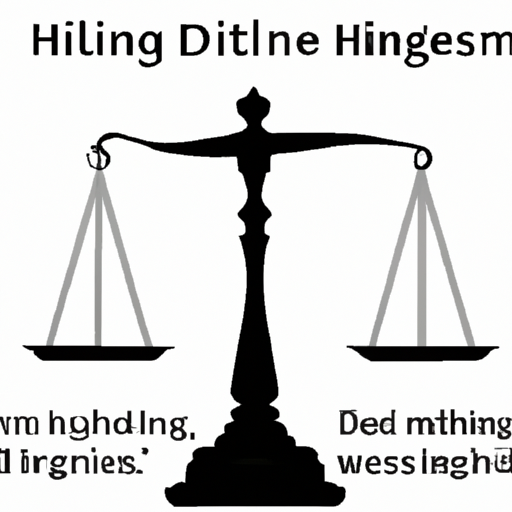Hiring discrimination laws are a critical aspect of employment law that every business owner should be familiar with. These laws aim to protect individuals from unfair treatment during the hiring process, ensuring that hiring decisions are based on merit rather than discriminatory factors such as race, gender, religion, or disability. By understanding and complying with these laws, businesses can maintain a fair and inclusive workplace, avoid costly legal battles, and build a positive reputation in the market. In this article, we will explore the key aspects of hiring discrimination laws, providing you with essential knowledge and actionable insights to navigate this area of law effectively. Let’s dive in!

Overview of Hiring Discrimination Laws
Hiring discrimination laws aim to protect individuals from unfair treatment during the hiring process based on certain protected characteristics. These laws prohibit employers from making decisions about hiring, promotion, or other employment-related actions solely based on an individual’s race, gender, age, disability, religion, national origin, or ethnicity. The purpose of these laws is to provide equal opportunities for all individuals and ensure a diverse and fair workforce.
Definition of Hiring Discrimination
Hiring discrimination refers to the act of treating job applicants unfairly or unequally based on their protected characteristics. It involves making employment decisions, such as hiring, promotion, or termination, on the basis of factors unrelated to job qualifications or performance. Discrimination can occur at any stage of the hiring process, including job advertisements, application screening, interviews, and final selection decisions.
Hiring discrimination often violates federal and state employment laws, such as the Title VII of the Civil Rights Act of 1964, the Age Discrimination in Employment Act (ADEA), the Americans with Disabilities Act (ADA), and the Equal Pay Act (EPA).

Types of Hiring Discrimination
1. Age Discrimination
Age discrimination occurs when an employer treats an individual less favorably because of their age, typically against older workers. Such discrimination may involve refusal to hire, reduced job responsibilities, unfavorable performance evaluations, or termination based on age. The ADEA protects individuals who are 40 years of age or older from age-based discrimination.
2. Gender Discrimination
Gender discrimination involves treating individuals unfairly based on their gender. It includes disparate treatment (treating one gender less favorably than another) and disparate impact (unintentional discrimination that affects one gender more negatively). Examples of gender discrimination in hiring include refusing to hire women for traditionally male-dominated roles or paying men and women differently for the same work. Title VII of the Civil Rights Act protects individuals from gender-based discrimination.
3. Race and Ethnicity Discrimination
Race and ethnicity discrimination occur when job applicants are treated differently due to their race or nationality. This type of discrimination can manifest through disparate treatment, such as favoring a particular race or ethnic group during the selection process, or disparate impact, which unintentionally affects certain races or ethnicities more adversely. Title VII prohibits race and ethnicity discrimination.
4. Disability Discrimination
Disability discrimination involves treating individuals with disabilities unfairly in the hiring process. Employers are required to provide reasonable accommodations to qualified individuals with disabilities unless doing so would cause undue hardship. Disability discrimination may include failing to provide accessible job applications or interview processes or making decisions based on assumptions or stereotypes about disabilities. The ADA protects individuals with disabilities from such discrimination.
5. Religion Discrimination
Religion discrimination occurs when job applicants are treated unfavorably due to their religious beliefs or practices. It includes refusing to hire individuals because of their religious attire, scheduling conflicts with religious practices, or making employment decisions based on stereotypes or prejudices about specific religions. Title VII provides protection against religion-based discrimination.
6. National Origin Discrimination
National origin discrimination involves treating individuals unfavorably due to their place of birth, ancestry, or linguistic characteristics. Examples of national origin discrimination in hiring include refusing to hire individuals because of their accent or requiring specific language skills that are unrelated to job requirements. Title VII prohibits discrimination based on national origin.
5. What damages can I recover if I win a hiring discrimination lawsuit?
If you successfully win a hiring discrimination lawsuit, you may be entitled to various types of damages. These damages aim to compensate you for the harm you suffered as a result of the discriminatory actions taken by the employer. The potential damages include:
- Back Pay: This includes wages and benefits that you would have earned if you had been hired or promoted as a result of the discriminatory action.
- Front Pay: If the court determines that it is not feasible to reinstate you in your position, you may be awarded front pay, which is compensation for future lost wages and benefits.
- Compensatory Damages: These damages aim to compensate you for emotional distress, mental anguish, and other non-economic harm caused by the discrimination.
- Punitive Damages: In certain cases, if the employer’s actions are particularly egregious, the court may award punitive damages, which are designed to punish the employer and deter similar misconduct in the future.
- Attorney’s Fees: In some instances, if you prevail in the lawsuit, the court may order the employer to pay your attorney’s fees and litigation costs.
It is essential to consult with an experienced employment discrimination attorney to understand the damages you may be eligible to recover based on the specific circumstances of your case.

FAQs
Q: How can I determine if I have been a victim of hiring discrimination?
A: If you believe you have been a victim of hiring discrimination, it is advisable to consult with an employment discrimination attorney. They can assess your situation, review the evidence, and determine if there are grounds for a discrimination claim.
Q: Can an employer consider job applicants’ criminal records during the hiring process?
A: While employers can consider criminal records, they must comply with fair hiring practices and ensure that their policies do not have a disparate impact on certain protected groups. Blanket disqualification based on criminal records can be seen as discriminatory if it disproportionately affects individuals from specific racial or ethnic backgrounds.
Q: Are there any exceptions to hiring discrimination laws for small businesses?
A: In general, hiring discrimination laws apply to businesses of all sizes. However, some small businesses may have limited exceptions regarding the number of employees or certain religious organizations when considering religious discrimination claims. It is essential to consult with an attorney to understand the specific laws applicable to your situation.
Q: How should I document incidents of hiring discrimination for legal purposes?
A: It is crucial to maintain a detailed record of any incidents of hiring discrimination you encounter. Document the date, time, location, individuals involved, and any relevant details or conversations. Keep copies of emails, job advertisements, and other relevant documents that may support your case.
Q: How long do I have to file a hiring discrimination claim?
A: The time limit to file a hiring discrimination claim depends on the specific laws applicable in your jurisdiction. In most cases, you must first file a complaint with an administrative agency before pursuing a lawsuit. It is critical to consult with an attorney promptly to understand the applicable deadlines in your situation.
Remember, the information provided in this article is for general informational purposes only and should not be construed as legal advice. If you have concerns about hiring discrimination or other employment-related issues, seek professional guidance from an experienced employment discrimination attorney.
